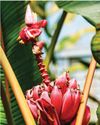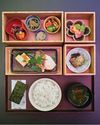
MY FIRST TASTE of the Gaspé Peninsula was a mouthful of flowers: a spoon piled with petals was offered to me when I visited five years ago. Quebecers are surprised when I tell them about it. That's partly because the fertile eastern hunk of Canada, jutting out into the Gulf of St. Lawrence as if it were trying to visit Newfoundland, is where much of the population of Quebec went for their childhood holidays without being much disturbed by international tourists like me. It's also because, while the Gaspé is famous for a type of food, it isn't flowers. It's fish.
When I went back last September with my husband, Craig, to make a full circuit of the peninsula, I discovered that, even in our age of disappearing resources, that is still the case. There are 22 salmon rivers on the peninsula, their clear water fringed with trees. Fantastic fresh seafood is served everywhere, from small island shacks to stylish waterside restaurants. But the fish have always been more than just dinner. The history of the peninsula could be written in fins and scales.
The Indigenous people whose ancestral territory this is, the Mi'kmaq, probably migrated east up the St. Lawrence River, past what is now Montreal and Quebec City, then stayed because the food was so plentiful. Around the year 1000, the Vikings showed up to fish cod, then dry and salt it for transport across the Atlantic. In 1534, Jacques Cartier arrived, planted a large crucifix in what is now the town of Gaspé, and claimed the entire country for France. Gaspésie, the French name for the peninsula, comes from the Mi'kmaq name Gespeg, meaning "land's end." But given that the Atlantic was the medieval equivalent of a highway connecting North America to Europe, “land's beginning" might be just as appropriate.
Esta historia es de la edición October 2023 de Travel+Leisure US.
Comience su prueba gratuita de Magzter GOLD de 7 días para acceder a miles de historias premium seleccionadas y a más de 9,000 revistas y periódicos.
Ya eres suscriptor ? Conectar
Esta historia es de la edición October 2023 de Travel+Leisure US.
Comience su prueba gratuita de Magzter GOLD de 7 días para acceder a miles de historias premium seleccionadas y a más de 9,000 revistas y periódicos.
Ya eres suscriptor? Conectar

Oodles of Noodles
Slurping through a lantern-lit alley in Sapporo, Japan, where miso ramen was born

The Sweet Spot
Just an hour south of Miami, Nora Walsh finds a candyland of tropical fruits ripe for picking.

Freshly Brewed
In the Cederberg Mountains of South Africa, Kendall Hunter discovers the powerful effects of the humble rooibos plant.

SHORE LEAVE
Raw, wild, and mind-bendingly remote, yet peppered with world-class wineries and restaurants-Australia's South West Edge is a study in contrasts.

Of Land and Sea
Savoring French flavors on a gastronomic trail between Marseille and Dijon.

FAMILY-STYLE
Food writer MATT GOULDING couldn't wait to get back to the hushed omakase restaurants of Tokyo, Kyoto, and Osaka. But would his young kids love the country-and its cuisine as much as he does?

HAPPY MEAL
Many tascas, the no-frills dining spots in Lisbon, have vanished. But others, Austin Bush discovers, are being lovingly reinvented.

A City Abuzz
In underappreciated Trieste, Taras Grescoe finds some of Italy's most storied-and spectacular-coffee shops.

FJORD FOCUS
Norway in December? Crazy-and crazy beautiful. Indulging a family wish, Akash Kapur discovers a world of icy enchantment.

DESTINATION OF THE YEAR Thailand
Full disclosure: I didn't like Bangkok at first. I didn't get it—the chaos, the traffic, the fact that everything was hard to find. But like all good love affairs, my relationship with Thailand—which deepened when I moved from Vietnam 12 years ago to work at Travel + Leisure Southeast Asia, where I'm now editor in chief—took time to blossom.